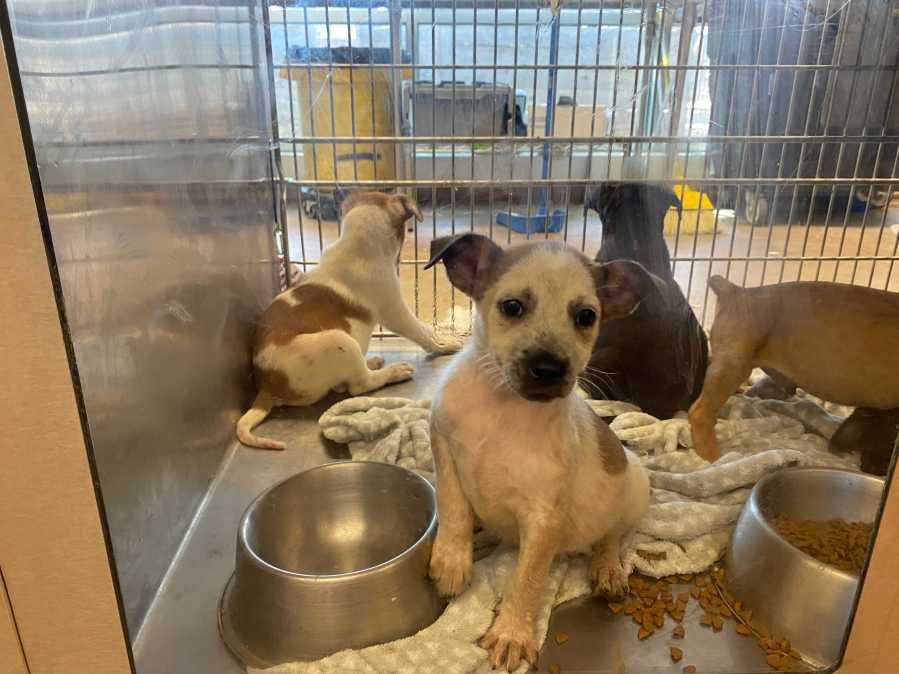AUSTIN (KXAN) — Austin leaders are once again discussing whether or not to undo city code that prohibits Austin’s city shelter from spaying a visibly pregnant animal (unless medically necessary) until rescue groups have had the chance to step in.
As part of the city council’s budget discussions this week, several council members introduced a resolution that would amend city code to “allow for veterinarians employed by the City to spay and neuter all animals owned by the City without delay or notification,” according to the agenda item. It would also “restore veterinary decision-making regarding spaying and neutering animals owned by the City.”
KXAN reported on the topic in 2022 when the Austin Animal Advisory Commission took it up for consideration.
At the time, KXAN spoke with Dr. Paige Nilson, a practicing veterinarian and the newly elected Chair of the Animal Advisory Commission.
Nilson spoke during public comment at the city council meeting on Wednesday, in favor of the resolution. She said she wasn’t speaking in the role of Chair at the council meeting, rather as practicing veterinarian and “passionate animal advocate,” in her words.
Nilson told KXAN back in 2022 that the rule contributes to the overpopulation problem at the shelter, and maintained that view during her public comment on Wednesday. She added that spaying pregnant cats and dogs is a routine procedure and humane when done in accordance with the current guidelines from the Association of Shelter Veterinarians.
The resolution would change what happens when pregnant animals are brought to the Austin Animal Center, the municipal shelter for the city of Austin and unincorporated Travis County.
Under the current code, which comes from a 2019 ordinance, organizations such as Austin Pets Alive! are notified before an animal at AAC that has reached full-term pregnancy is spayed, which would terminate the pregnancy and “abort” the fetuses.
APA! can then take in the pregnant animal, rather than AAC keeping the animal and spaying it and terminating the pregnancy. APA! would then be responsible for caring for and adopting out the animal and the puppies/kittens born from that pregnancy.
APA! is against the resolution. Dr. Ellen Jefferson, President and CEO of APA! spoke to KXAN Wednesday morning about it, and the potential solution APA! is proposing as an alternative to the resolution.
“For the last 12 years, we’ve been taking all of those animals, as many as we’ve been made aware of, which is part of our ordinance,” Jefferson said. “And so if this goes through, then there would be no government mandate that requires any kind of transparency about the animals that are at Austin Animal Center and are vulnerable and need help, and need to go to an organization like ours, where they can go into a foster home and raise their babies and then go on and get spayed and neutered. And so we find this deeply troubling.”
Jefferson said APA! believes the resolution was introduced in an effort to save $300,000. She said APA!’s proposal is to have AAC send 100% of the affected animals to them. KXAN has not independently confirmed Jefferson’s claim of the approximated savings, but we’ve reached out to the city council members who sponsored the agenda item. We will update this story if we receive responses.
One person who spoke in favor of the resolution during public comment on Wednesday said when it comes to APA!’s stance, “it sounds like for-profit breeding,” since APA! charges a fee per adoption.
Jefferson, however, told KXAN that APA! believes taking in pregnant animals and then caring for and adopting out their babies could drive people away from breeders, since their shelter already has puppies and kittens.
“What this does is it allows everybody be part of the adoption process in Austin and be part of saving lives and not be, for lack of better word, driven to breeders to find puppies and kittens, because they exist in our shelters already,” Jefferson said.
According to APA!’s website, the adoption fees cover the cost of spay/neuter surgery, heartworm and FeLV testing for cats and dogs that are old enough, vaccinations, deworming and flea/tick treatment, microchipping and more.
City council has not yet taken action on the item at the time of publishing this story.
